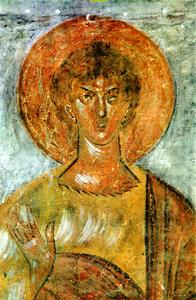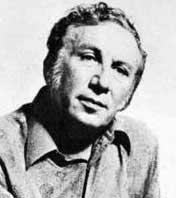| Translate | |
|---|---|
 | |
| Studio album by | |
| Released | 2006 |
| Length | 46:21 |
Translate is an album by Sexy Sadie, released in 2006.
| Translate | |
|---|---|
 | |
| Studio album by | |
| Released | 2006 |
| Length | 46:21 |
Translate is an album by Sexy Sadie, released in 2006.

Abel is a Biblical figure in the Book of Genesis within Abrahamic religions. He was the younger brother of Cain, and the younger son of Adam and Eve, the first couple in Biblical history. He was a shepherd who offered his firstborn flock up to God as an offering. God accepted his offering but not his brother's. Cain then killed Abel out of jealousy.

Boris Leonidovich Pasternak was a Russian poet, novelist, composer, and literary translator. Composed in 1917, Pasternak's first book of poems, My Sister, Life, was published in Berlin in 1922 and soon became an important collection in the Russian language. Pasternak's translations of stage plays by Goethe, Schiller, Calderón de la Barca and Shakespeare remain very popular with Russian audiences.

The Latin cogito, ergo sum, usually translated into English as "I think, therefore I am", is the "first principle" of René Descartes's philosophy. He originally published it in French as je pense, donc je suis in his 1637 Discourse on the Method, so as to reach a wider audience than Latin would have allowed. It later appeared in Latin in his Principles of Philosophy, and a similar phrase also featured prominently in his Meditations on First Philosophy. The dictum is also sometimes referred to as the cogito. As Descartes explained in a margin note, "we cannot doubt of our existence while we doubt." In the posthumously published The Search for Truth by Natural Light, he expressed this insight as dubito, ergo sum, vel, quod idem est, cogito, ergo sum. Antoine Léonard Thomas, in a 1765 essay in honor of Descartes presented it as dubito, ergo cogito, ergo sum.

In Greek mythology, Hippocrene was a spring on Mount Helicon. It was sacred to the Muses and formed when the winged horse Pegasus struck his hoof into the ground, whence its name which literally translates as "Steed/Horse's Fountain". The water was supposed to bring forth poetic inspiration when imbibed.

Nizar Tawfiq Qabbani was a Syrian diplomat, poet, writer and publisher. He is considered to be Syria's National Poet. His poetic style combines simplicity and elegance in exploring themes of love, eroticism, religion, and Arab empowerment against foreign imperialism and local dictators. Qabbani is one of the most revered contemporary poets in the Arab world.

Targum Onkelos is the primary Jewish Aramaic targum ("translation") of the Torah, accepted as an authoritative translated text of the Five Books of Moses and thought to have been written in the early second century CE.

The Farewell Sermon also known as Muhammad's Final Sermon or the Last Sermon, is a religious speech, delivered by the Islamic prophet Muhammad on Friday the 9th of Dhu al-Hijjah, 10 AH in the Uranah valley of Mount Arafat, during the Islamic pilgrimage of Hajj. Muhammad al-Bukhari refers to the sermon and quotes part of it in his Sahih al-Bukhari. Part of it is also present in Sahih Muslim and Sunan Abu Dawood. Verse 5:3, "Today I have perfected for you your religion ...", is believed to have been recited during the address as the capstone verse of the Quran. Various versions of the sermon have been published, including several English translations. The sermon consists of a series of general exhortations for Muslims to follow the teachings that Muhammad had set forth in the Quran and sunnah.
Al-Kawthar is the 108th chapter (sūrah) of the Quran. It is the shortest chapter, consisting of three ayat or verses:

At-Takāthur is the 102nd chapter (sūrah) of the Qur'an, with 8 verses (āyāt). Regarding the timing and contextual background of the believed revelation, it is an earlier "Meccan surah", which means it is believed to have been revealed in Mecca, rather than later in Medina.

Psalm 23 is the 23rd psalm of the Book of Psalms, beginning in English in the King James Version: "The Lord is my shepherd". In Latin, it is known by the incipit, "Dominus regit me". The Book of Psalms is part of the third section of the Hebrew Bible, and a book of the Christian Old Testament. In the slightly different numbering system used in the Greek Septuagint and Latin Vulgate translations of the Bible, this psalm is Psalm 22.

The Words of Institution are words echoing those of Jesus himself at his Last Supper that, when consecrating bread and wine, Christian Eucharistic liturgies include in a narrative of that event. Eucharistic scholars sometimes refer to them simply as the verba.

Google Translate is a multilingual neural machine translation service developed by Google to translate text, documents and websites from one language into another. It offers a website interface, a mobile app for Android and iOS, as well as an API that helps developers build browser extensions and software applications. As of 2022, Google Translate supports 133 languages at various levels; it claimed over 500 million total users as of April 2016, with more than 100 billion words translated daily, after the company stated in May 2013 that it served over 200 million people daily.
Dóminus vobíscum is an ancient salutation and blessing traditionally used by the clergy in the Masses of the Catholic Church and other liturgies, as well as liturgies of other Western Christian denominations, such as Lutheranism, Anglicanism and Methodism.

The anointings of Jesus’s head or feet are events recorded in the four gospels. The account in Matthew 26, Mark 14, and John 12 takes place on the Holy Wednesday of Holy Week at the house of Simon the Leper in Bethany, a village in Judaea on the southeastern slope of the Mount of Olives. In Matthew and Mark, he is anointed by an unnamed woman. In John, the woman is identified as Mary of Bethany, the sister of Martha and Lazarus of Bethany. The event in Luke features an unnamed sinful woman, and is in the northern region, as Luke 7 indicates Jesus was ministering in the northern regions of Nain and Capernaum. The honorific anointing with perfume is an action frequently mentioned in other literature from the time; however, using long hair to dry Jesus's feet, as in John and Luke, is not recorded elsewhere, and should be regarded as an exceptional gesture. Considerable debate has discussed the identity of the woman, the location, timing, and the message.
ʼAuhelawa is an Austronesian language found in Nuakata Island and the southeastern tip of Normanby Island in Milne Bay Province, Papua New Guinea. It was spoken by about 1,200 people in 1998, 30% of whom were monolingual in the language.
Amor fati is a Latin phrase that may be translated as "love of fate" or "love of one's fate". It is used to describe an attitude in which one sees everything that happens in one's life, including suffering and loss, as good or, at the very least, necessary.
"Dirty Hungarian Phrasebook" is a Monty Python sketch. It first aired in 1970 on Monty Python's Flying Circus as part of Episode 25, and also appears in the film And Now for Something Completely Different. Atlas Obscura has noted that it may have been inspired by English as She Is Spoke, a 19th-century Portuguese–English phrase book regarded as a classic source of unintentional humour, as the given English translations are generally completely incoherent.
Samiri or the Samiri is a phrase used by the Quran to refer to a rebellious follower of Moses who created the golden calf and attempted to lead the Hebrews into idolatry. According to the twentieth chapter of the Quran, Samiri created the calf while Moses was away for 40 days on Mount Sinai, receiving the Ten Commandments. In contrast to the account given in the Hebrew Bible, the Quran does not blame Aaron for the calf’s creation.
Yali is a Papuan language of Indonesian New Guinea. The Yali people live east of the Baliem Valley, in the Western Highlands.

The death of Vincent van Gogh, the Dutch post-Impressionist painter, occurred in the early morning of 29 July 1890, in his room at the Auberge Ravoux in the village of Auvers-sur-Oise in northern France. Two days earlier, Van Gogh shot himself.